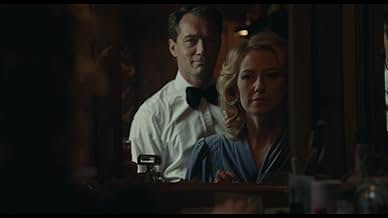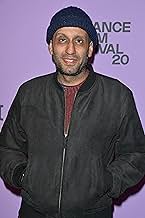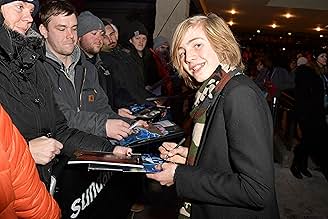AVALIAÇÃO DA IMDb
6,3/10
20 mil
SUA AVALIAÇÃO
A vida de um empresário e de sua família americana começa a dar uma reviravolta depois de se mudar para uma mansão rural inglesa.A vida de um empresário e de sua família americana começa a dar uma reviravolta depois de se mudar para uma mansão rural inglesa.A vida de um empresário e de sua família americana começa a dar uma reviravolta depois de se mudar para uma mansão rural inglesa.
- Direção
- Roteirista
- Artistas
- Prêmios
- 5 vitórias e 28 indicações no total
Avaliações em destaque
Nicely played and it does have some interesting themes but it never makes the most of them, feeling dramatically inert for long periods. All of the tense scenes are in the trailer, the rest is a rather humdrum, if never quite boring, collection of family scenes. Saved from being a 5 by the final few reels.
Hoo boy, let the discussions flow.
It is rather lovely to soak in a well made piece of cinema that will no doubt elicit a bevy of experiences depending on the audience. "The Nest" has a basic mid-life family implosion crisis plot at it's core, but just how rotten is it?
Jude Law (Rory) is a slick talking investment advisor, living a comfortable New York life, with a pretty horse-training wife, and requisite two children. Yet he yearns for more. Soon the quartet are off to his England, to live in an isolated ancient mansion filled with too many rooms, a table so big it cannot leave the premises, and secret doors. Sounds like a horror movie, and in a sense, it is. Just not of the supernatural variety.
Law owns the screen as the flashy business stud, pushing all his chips into the middle of the table, dragging his reluctant dependents along for the ride. Carrie Coon (Allison) is his American match, willingly embracing her husband and his white lies until breaking point, then unleashing a vindictive, cruel yet understandable side in their escalating partnership.
Is this a family drama? An allegory for greed? A warning? A husband and wife coming to relationship climax?
A riveting turning point, actually one of many, has Allison beaming beside her man at a posh dinner party, as the boss welcomes him back to the English fold, revealing a devastating lie. Her smile doesn't break, but it is clear that there is trouble a foot. Much trouble. The husband and wife dance continues, but as finances spiral out of control, the tight solitary quartet starts to crack.
Every act is punctuated by a primo British new wave nugget from the likes of the Cure or Psychedelic Furs as a reminder we are in the eighties. It is a rather odd reminder, as the movie really doesn't depend on an era, other than referencing the greediness of the Reagan and Thatcher right uprising. It does elicit a weird alarm bell of nostalgia for anyone of that age, and perhaps was a bit of directorial self-indulgence. Not unwelcome mind you.
How and not why this plays out is the strength of this film. Blame is easy to hurl, but sometimes life is the problem.
A moody a piece of cinema, both visually and thematically, "The Nest" is a film that leaves an odd, bitter aftertaste, long after the main course is digested. A burner.
It is rather lovely to soak in a well made piece of cinema that will no doubt elicit a bevy of experiences depending on the audience. "The Nest" has a basic mid-life family implosion crisis plot at it's core, but just how rotten is it?
Jude Law (Rory) is a slick talking investment advisor, living a comfortable New York life, with a pretty horse-training wife, and requisite two children. Yet he yearns for more. Soon the quartet are off to his England, to live in an isolated ancient mansion filled with too many rooms, a table so big it cannot leave the premises, and secret doors. Sounds like a horror movie, and in a sense, it is. Just not of the supernatural variety.
Law owns the screen as the flashy business stud, pushing all his chips into the middle of the table, dragging his reluctant dependents along for the ride. Carrie Coon (Allison) is his American match, willingly embracing her husband and his white lies until breaking point, then unleashing a vindictive, cruel yet understandable side in their escalating partnership.
Is this a family drama? An allegory for greed? A warning? A husband and wife coming to relationship climax?
A riveting turning point, actually one of many, has Allison beaming beside her man at a posh dinner party, as the boss welcomes him back to the English fold, revealing a devastating lie. Her smile doesn't break, but it is clear that there is trouble a foot. Much trouble. The husband and wife dance continues, but as finances spiral out of control, the tight solitary quartet starts to crack.
Every act is punctuated by a primo British new wave nugget from the likes of the Cure or Psychedelic Furs as a reminder we are in the eighties. It is a rather odd reminder, as the movie really doesn't depend on an era, other than referencing the greediness of the Reagan and Thatcher right uprising. It does elicit a weird alarm bell of nostalgia for anyone of that age, and perhaps was a bit of directorial self-indulgence. Not unwelcome mind you.
How and not why this plays out is the strength of this film. Blame is easy to hurl, but sometimes life is the problem.
A moody a piece of cinema, both visually and thematically, "The Nest" is a film that leaves an odd, bitter aftertaste, long after the main course is digested. A burner.
- hipCRANK
It was raining so I decided to take a chance on this film. I shouldn't have bothered about it. It was slow and boring. The disintegration of a yuppie marriage. That was it,nothing more and a total bore.
It's the 80's. Ambitious commodities trader Rory O'Hara (Jude Law) returns to London taking his wife Allison (Carrie Coon) and their two kids. He is pushing for a big deal with a big payout. He is spending beyond his means and moves the family again to a country mansion. It causes friction with his wife and exacerbating their money trouble.
I like the idea of this family descending into dysfunction. I find a lot of it very compelling. Law and Coon are delivering intriguing performances. Filmmaker Sean Durkin, who made Martha Marcy May Marlene, is trying to give this film a quiet, naturalistic feel. It does need to be a bit clearer with the beginning. It's just too slow until the money troubles begin. That really raises the intensity and the movie picks up steam. Quite frankly, the start bored me to the point of passing out and I had to start over again. The passive filmmaking style is not conducive to paying attention.
I like the idea of this family descending into dysfunction. I find a lot of it very compelling. Law and Coon are delivering intriguing performances. Filmmaker Sean Durkin, who made Martha Marcy May Marlene, is trying to give this film a quiet, naturalistic feel. It does need to be a bit clearer with the beginning. It's just too slow until the money troubles begin. That really raises the intensity and the movie picks up steam. Quite frankly, the start bored me to the point of passing out and I had to start over again. The passive filmmaking style is not conducive to paying attention.
Sean Durkin's new film is a modest yet searing drama about a family that relocates from the United States to the English countryside after the father (Jude Law,) an entrepreneur, moves his job. The move eventually brings out a variety of conflicts between him and his wife. The film works best as both a layered character study of the two leads (Jude Law and Carrie Coon.) Both of them are very well-developed as characters, with their strengths yet deep-seated flaws thoughtfully communicated. Viewers are able to feel for both of them, and will understand their imperfections while simultaneously sympathizing with some aspects of their daily lives.
The film's aesthetic, including the score, are beautifully understated. This isn't a flashy film, but it's not trying to be. The score is ominous yet powerful and moody in the best way possible. The screenplay goes a great job ratcheting up dramatic tension between the husband and wife, while also providing careful context to the narrative on many levels-Jude Law's character's work situation, the characters' relations with others they meet while settling into life in the UK, and how they respond to difficult and adverse events. The main couple's children are also thoughtfully depicted in the script; the writing shows them to be dynamic yet shaped by a variety of external circumstances in their personal and familial lives. The acting is terrific across the board, as the main characters are able to clearly convey raw grit and anguish as their interpersonal relationships end up getting increasingly muddy and dysfunctional. All in all, this is a complex, smart and well-made look at the the impact of greed on our lives, as well as the intricacies that govern how we respond to each other during difficult and uncertain times. Despite all of these positive qualities, the third act is a bit underwhelming and fails to completely satisfy or pack the expected emotional wallop. Instead, it leaves us with a feeling that doesn't quite add up to the sum of its previous parts. As a result, the film is not a home run. Yet I do recommended it without hesitation to patient viewers who can appreciate challenging, slow-burn cinema. 7/10
The film's aesthetic, including the score, are beautifully understated. This isn't a flashy film, but it's not trying to be. The score is ominous yet powerful and moody in the best way possible. The screenplay goes a great job ratcheting up dramatic tension between the husband and wife, while also providing careful context to the narrative on many levels-Jude Law's character's work situation, the characters' relations with others they meet while settling into life in the UK, and how they respond to difficult and adverse events. The main couple's children are also thoughtfully depicted in the script; the writing shows them to be dynamic yet shaped by a variety of external circumstances in their personal and familial lives. The acting is terrific across the board, as the main characters are able to clearly convey raw grit and anguish as their interpersonal relationships end up getting increasingly muddy and dysfunctional. All in all, this is a complex, smart and well-made look at the the impact of greed on our lives, as well as the intricacies that govern how we respond to each other during difficult and uncertain times. Despite all of these positive qualities, the third act is a bit underwhelming and fails to completely satisfy or pack the expected emotional wallop. Instead, it leaves us with a feeling that doesn't quite add up to the sum of its previous parts. As a result, the film is not a home run. Yet I do recommended it without hesitation to patient viewers who can appreciate challenging, slow-burn cinema. 7/10
Você sabia?
- CuriosidadesWhen he first read the screenplay, Jude Law had to admit that he really didn't like his character.
- Erros de gravaçãoWhen Rory is travelling home from work by train, the sound of a steam locomotive whistle is clearly heard. Steam was discontinued on Britain's railways in 1968.
- Citações
Taxi Driver: You a good dad?
Rory O'Hara: Yeah, I'm the best. I keep a roof over their head, I give them the best of everything. and I've never laid a hand in them, never would.
Taxi Driver: That's the bare minimum mate. Don't pat yourself on the back for that.
- Trilhas sonorasDrone Beat
Written by Richard Reed Parry, Parker Shper, Stuart Bogie
Performed by the Quiet Club Ensemble [Parry/Shper/Bogie/Paul]
Principais escolhas
Faça login para avaliar e ver a lista de recomendações personalizadas
- How long is The Nest?Fornecido pela Alexa
Detalhes
- Data de lançamento
- Países de origem
- Centrais de atendimento oficiais
- Idioma
- Também conhecido como
- The Nest
- Locações de filme
- Empresas de produção
- Consulte mais créditos da empresa na IMDbPro
Bilheteria
- Faturamento bruto nos EUA e Canadá
- US$ 137.886
- Fim de semana de estreia nos EUA e Canadá
- US$ 65.540
- 20 de set. de 2020
- Faturamento bruto mundial
- US$ 2.122.682
- Tempo de duração
- 1 h 47 min(107 min)
- Cor
- Proporção
- 1.85 : 1
Contribua para esta página
Sugerir uma alteração ou adicionar conteúdo ausente






































